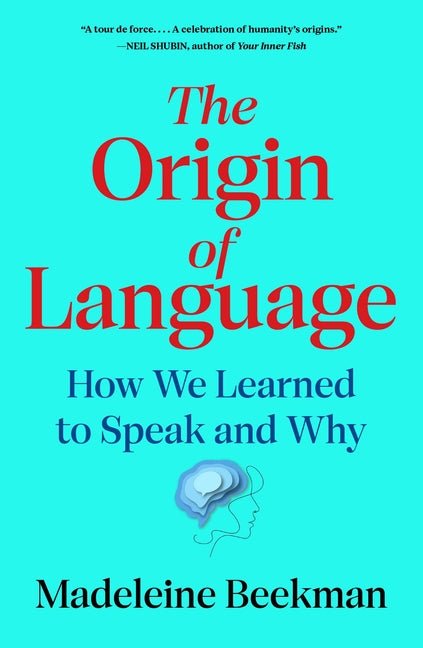Simon & Schuster
The Origin of Language: How We Learned to Speak and Why
Couldn't load pickup availability
In a radical new story about the birth of our species, The Origin of Language argues that it was not hunting, fighting, or tool-making that forced early humans to speak, but the inescapable need to care for our children.
Journeying to the dawn of Homo sapiens, evolutionary biologist Madeleine Beekman reveals the "happy accidents" hidden in our molecular biology--DNA, chromosomes, and proteins--that led to one of the most fateful events in the history of life on Earth: our giving birth to babies earlier in their development than our hominid cousins the Neanderthals and Denisovans. Faced with highly dependent infants requiring years of nurturing and protection, early human communities needed to cooperate and coordinate, and it was this unprecedented need for communication that triggered the creation of human language--and changed everything.
Infused with cutting-edge science, sharp humor, and insights into the history of biology and its luminaries, Beekman weaves a narrative that's both enlightening and entertaining. Challenging the traditional theories of male luminaries like Chomksy, Pinker, and Harari, she invites us into the intricate world of molecular biology and its ancient secrets. The Origin of Language is a tour de force by a brilliant biologist on how a culture of cooperation and care have shaped our existence.
Share
Book Details
ISBN:
9781668066058
EAN:
9781668066058
Binding:
Hardcover
Pages:
320
Authors:
Madeleine Beekman
Publisher:
Simon & Schuster

Beekman takes us through a series of genetic glitches that allowed for and instigated bigger brains, and then marshals a variety of science studies to conclude that human childcare was the key selective pressure to make us chatty and cooperative masters of our own fate.Are we really such masters? What more do we have to learn from the communication and cooperation found in nature?
Calling this book "easy to read" is utterly false. I have a PhD (in English) and I gave up in chapter 3. The material is so relentlessly technical that I was swamped, and my degree is actually in linguistics--a very technical field. I was drawn to the book because the origin of language is so far in the past that all we can do to try and understand how it came about is to speculate--at least that is all we can do at this point. I was interested in Beekman's speculation. But she is apparently not interested in reaching people like me.
An evolutionary biologist explores how the the helplessness of human babies at birth necessitated unprecedented cooperation and communication, ultimately leading to the development of human language.This brilliant, easy-to-read book is not about linguistics but instead focuses on a multidisciplinary approach to physical and cognitive evolution. For instance, as human ancestors became bipedal, mothers started carrying their babies in their arms rather than on their backs. This inhibited their ability to collect food, perhaps forcing them to form a pair bond with the baby’s father in order to keep the infant alive. Physical changes required social changes on a seven-million-year odyssey leading to language. Anyone interested in human evolution, particularly cognitive evolution, will enjoy this book.Thanks, NetGalley, for the ARC I received. This is my honest and voluntary review.


